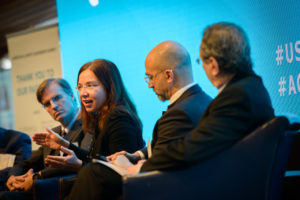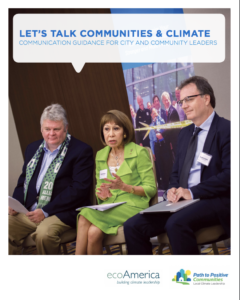Bringing Climate Into Our Conversations
I recently had the opportunity to attend a lecture at Davidson College by renowned climate scientist Katharine Hayhoe. These days I speak about climate a lot, and when it comes to the actual science I always preface my remarks, “I am not a climate scientist.” Then I give a brief overview of the changes that are measurable in temperature, sea level and other impacts, and like Greta Thunberg, I say, “but don’t listen to me, listen to the scientists.” We know that over 99% of climate scientists worldwide are in agreement, an overwhelming consensus, and they agree that the Earth is warming and that human activity is driving it.

It was helpful for me to hear from a climate scientist about the way that climate change operates as a threat multiplier. Hayhoe explained that the military also uses this term, when assessing global events which exacerbate instability, migration patterns, and operational challenges for their troops and their equipment. She explained that the warming air and oceans do not create more storms; rather they contribute to stronger, wetter, larger and longer-lasting storms, thereby increasing the damage and destruction caused. That is the definition of a threat multiplier.
The idea of climate as a threat multiplier also applies to other areas, such as changing migration patterns, famine, poverty, disease, natural disasters, housing shortages, even community violence and aggression. All of these challenges exist and have existed for centuries; but as the climate warms, they become more intense, more aggravated, longer lasting, and more dangerous. This is one good answer to those who say – trying to defend their lack of action on climate – that “we have always had storms, we have always had droughts and famine, and poverty will always be with us.” Yes, but – the warming climate will make all of these much worse, and the impacts will reach every one of us.

Hayhoe stressed as well the fact that those communities least able to recover from record floods, storms, fires and droughts – low income communities, rural communities, and frequently communities of color – often receive the worst impacts. This fact underscores the need for climate justice, and for seeking better ways to allocate resources for mitigation, adaptation and recovery.
Katharine Hayhoe was full of ideas for what everyone can do to help bring about change in the way our country is dealing with – or not dealing with – climate change. As is usual at a sustainability talk, she stressed individual actions we can take, such as driving less or buying an electric vehicle, recycling, eating less meat, and advocating with elected officials for clean energy plans. This resonates with eager community members, who want to do something to make the future better and healthier for their kids and their communities.
But Hayhoe stressed another solution as well. She said one of the most important things we can do is to talk about climate change, to bring it into our conversations with our neighbors, to raise it with our families, to integrate it into our values and our plans and our businesses, in the same way we integrate ideas like budget planning into every aspect of our lives. And of course, we need to bring it into our conversations about candidates, voting, and supporting city and county initiatives and ways to make our cities and homes more healthy, resilient, and clean.

Our mission at ecoAmerica is aligned perfectly with helping people have those climate conversations. We have an entire series of guides – called the “Let’s Talk” guides – that help people bring the climate conversation into their lives and their professions, in a non-partisan, positive, inclusive and non-threatening way. Whether you are a health professional, pastor, business person, or community leader, these guides provide tips and pointers on how to begin and continue those conversations that lead to action: Let’s Talk Faith and Climate; Let’s Talk Health and Climate; and Let’s Talk Communities and Climate.
So don’t listen to me, listen to a climate scientist – and bring climate conversations into other areas of your life and work. When these conversations grow, we will all feel supported to act more broadly and inclusively in moving our communities forward on resilience planning and climate solutions, in a just, inclusive, and effective way.
And if you want to be part of climate conversations with other national leaders, we hope you’ll join us on March 25 and 26 in Washington, DC, to explore ways we can raise our climate ambition in 2020, at the American Climate Leadership Summit. If you haven’t registered yet, there’s good news: you can save nearly $100 if you register by February 15!
